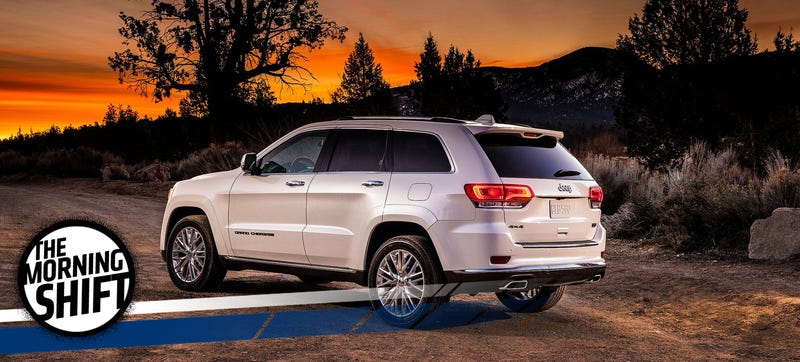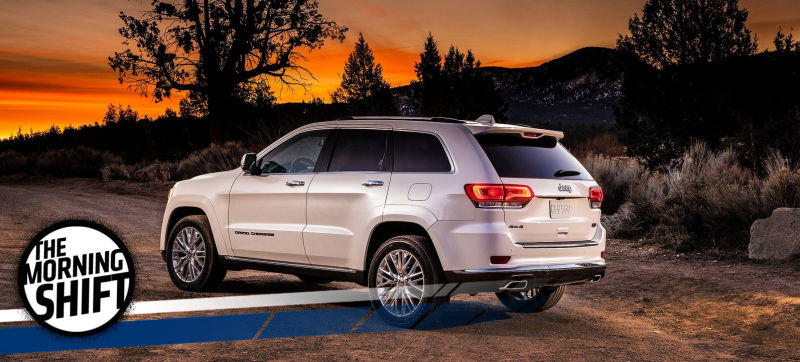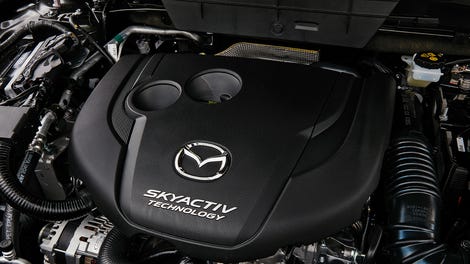
Good morning! Welcome to The Morning Shift, your roundup of the auto news you crave, all in one place every weekday morning. Here are the important stories you need to know.
1st Gear: Here Comes The Merger?
For years, citing a desire to reduce costs and redundancies, Fiat Chrysler boss Sergio Marchionne has sought a merger with just about everyone, perhaps most notably General Motors. They’ve all given him the Heisman. It’s very sad.
Advertisement
But a scintillating report out of Automotive News says that Fiat Chrysler is being eyeballed by several Chinese automakers seeking a “turnkey” operation with a presence in North America, Latin America and other markets, and at least one made an offer this month that was rejected for not being enough. Zounds!
Meanwhile, other sources independently identified executives from other large Chinese automakers conducting their own due diligence on a potential purchase of FCA, including meeting last week with representatives of U.S. retail groups about a potential acquisition. A source said FCA executives have traveled to China to meet with Great Wall Motor Co. And Chinese delegations were seen last week at FCA’s headquarters in Auburn Hills, Mich.
Chinese companies are under government pressure to expand outside China by acquiring foreign companies. FCA may be a perfect target, given that CEO Sergio Marchionne has focused on streamlining the automaker’s operations to make it enticing to a buyer, making bold moves such as exiting small cars and sedans and revamping the company’s manufacturing footprint.
It’s unclear which Chinese automaker or automakers are pursuing FCA. Different sources have pointed to involvement by different ones — Dongfeng Motor Corp., Great Wall, Zhejiang Geely Holding Group or FCA’s current joint venture partner in China, Guangzhou Automobile Group. But it is also unclear which company or companies are likely to follow through or succeed.
There’s a lot to unpack in this story. For one, it says a potential FCA sale could include Jeep, Ram, Chrysler and Dodge, but would exclude Ferrari, Alfa Romeo and Maserati—somewhat surprising to hear, given how important Alfa seems to be to future car platforms. (Then again, it could hypothetically take years to untangle a mechanical alliance.)
Advertisement
And as the story notes, it’s important to remember that the Chinese car companies still take a ton of direction from that country’s government, often merging and consolidating at their request. Those companies are under government pressure to expand their global reach and especially gain a foothold in the North American market. A purchase of FCA—much like Geely did with Volvo—would be an easy and quick way to do that.
And, this:
The prospect of selling FCA to a Chinese automaker has been on Marchionne’s mind awhile. In August 2015, months after he began his quest to merge or partner with another global automaker with his “Confessions of a Capital Junkie” presentation, and while he was launching his soon-to-be-rebuffed bid to merge with GM, the FCA CEO told Automotive News that he had closely studied potential tie-ups with numerous Asian automakers.
His conclusion: None of the Asian automakers was looking for partners.
He was asked: Anyone in Asia?
“I don’t think Asia is partnerable,” he said. “No, you can be acquired by the Asians. I think China will buy you.”
This makes a lot of sense, for both FCA and the Chinese! We will see what happens.
2nd Gear: Smart Shrinks
Besides the Car2Go service—and it’s not even clear if that’s profitable—it’s safe to say North America never quite warmed up to the Smart Fortwo the way European city-dwellers have. Now Smart is going all-electric in this market. That’s probably a wise move, but it does carry the consequence of even fewer Smart stores here. Two-thirds of dealers have chosen to drop the brand entirely than bother selling the little EVs, Automotive News reports:
More than two-thirds of U.S. Smart retail outlets have opted to stop selling Daimler AG’s microcar brand after it switches this year to offering only electric vehicles here. The shakeout will leave Smart with just 27 dealerships, fewer than even Lamborghini and Lotus.
Mercedes-Benz USA, which distributes Smart in the U.S., asked dealers to decide by the end of June whether to continue selling the ForTwo two-seater, the brand’s sole nameplate. Of Smart’s 85 outlets, 27 said they would remain, while 58 said they would move to a service-only operation, said company spokeswoman Donna Boland. Those numbers are preliminary, she said.
The 27 remaining Smart dealerships are largely concentrated in states with zero-emission vehicle mandates and that give Smart “the highest market penetration potential,” Boland said. Daimler executives had said they expected the remaining dealerships to be in cities such as San Francisco, New York, Los Angeles, Miami and Portland, Ore.
I can see both sides here. On one hand, dealers are often criticized for not really bothering to sell plug-in hybrids or electric vehicles, focusing instead on conventional inventory because it’s easier to move. (This is one of several reasons Tesla has for not opting into a franchise dealer system.)
Advertisement
On the other hand! I can see where a Smart EV is a tough sell, except in markets like California where cheap lease deals are super common. Does Smart even have a future in America?
3rd Gear: Why Toyota Goes Big On North America
With the often unpredictable President Donald Trump in office and NAFTA in his crosshairs, automakers seem wary about the future of trade rules in this region. That hasn’t stopped Toyota, which has a gigantic manufacturing base in this continent already, from going even bigger. It’s planning a new factory in the U.S. with Mazda, a factory in Mexico and expansion plans in Canada. What gives? Via Automotive News:
It gets Toyota on the good side of President Donald Trump, who months ago blasted the automaker over its Mexico plans. It launches a bidding war among states in a process that could spread Toyota’s political clout. It does nothing to alienate Mexico, which was left hanging earlier this year when Ford scratched plans for a car factory.
It helps accelerate Toyota’s push to rebalance its product mix and production capacity toward light trucks.
The reconfiguration doesn’t affect the expansion of RAV4 production in Canada, which has become a hub for hot-selling crossovers from Toyota and Lexus.
As the story notes, Toyota’s big problem at the moment is undercapacity. While other automakers like GM deal with too much supply, Toyota can’t meet customer demand quick enough. Investing locally and quickly helps mitigate that.
4th Gear: Weekly Car Payments?
We all know how Americans love to buy cars these days: with super-long terms on high interest rates and at price tags they can’t really afford, because we’re all just temporarily embarrassed millionaires whose ships will come in any day now, and Mr. Trump will make us all rich like he promised, so who cares anyway?
Turns out the Canadians are about to give us a run for our money—pardon the pun. The new trend in our neighbor to the north, Reuters reports, is smaller car payments done more frequently that add up to more in the end. Great!
Canadians are making smaller payments more frequently on auto term loans as new financing offers lure buyers away from the typical monthly billing cycle, a trend public advocacy groups say could push consumers to purchase more expensive vehicles that they simply cannot afford.
“Because long-term car loans tend to involve lower monthly or bi-weekly payments, extended terms can encourage consumers to buy more car than they may be able to afford,” said Kathryn Dunn, a spokeswoman for the Financial Consumer Agency of Canada
This new financing trend has made it easier for consumers to pile on debt, further extending already over-leveraged households.
Additionally:
Consumer appetite for weekly payments has been fueled by advertisements which tout smaller amounts that are paid in more frequent installments, said George Iny, director of the Automobile Protection Association, a Canadian consumer advocacy group. Iny said he believes the proportion of borrowers opting for weekly payments would be even higher than the data suggests, but some financial institutions accustomed to monthly and bi-weekly installments, have not yet produced the paperwork needed for such frequent payments.
“Psychologically, the amount sounds lower. It allows you to buy without feeling guilty,” he said.
Dammit, Canadians. You’re supposed to be the reasonable ones!
5th Gear: Who Is Fixing The EV Infrastructure Problem?
Hey, all you commenters clowning on Mazda for working on super-efficient gasoline engines and saying why bother because electrification is the future: it is, but it’s nothing without a robust charging infrastructure. And as automakers go big on EVs, pretty much globally we are nowhere near where we need to be to make that work. China, Norway and California are working on the problem, but it’s not being addressed much elsewhere. From the AP:
The distribution of public charging stations is wildly uneven around the globe. Places with lots of support from governments or utilities, like China, the Netherlands and California, have thousands of public charging outlets. Buyers of Tesla’s luxury models have access to a company-funded Supercharger network. But in many places, public charging remains scarce. That’s a problem for people who need to drive further than the 200 miles or so that most electric cars can travel. It’s also a barrier for the millions of people who don’t have a garage to plug in their cars overnight.
The uneven distribution of chargers worries many potential electric vehicle owners. It’s one reason electric vehicles make up less than 1 percent of cars on the road.
“Humans worst-case their purchases of automobiles. You have to prove to the consumer that they can drive across the country, even though they probably won’t,” says Pasquale Romano, the CEO of ChargePoint, one of the largest charging station providers in North America and Europe.
I’ll add two things here: one, that Romano is absolutely right that EV adoption won’t be truly widespread until charging a car is somehow every bit as convenient as gassing up your ICE car, and two, that none of this means shit environmentally until our grid is much heavier on renewable energy.
The cars are only one small part of the electric revolution.
Reverse: I Am Still Not On Speaking Terms With The Michelin Man; That Son Of A Bitch Knows Exactly What He Did
Neutral: Yea Or Nay On Chinese FCA?
I’d say there’s a solid chance of this happening. Would it impact your decision to buy an FCA product?
















